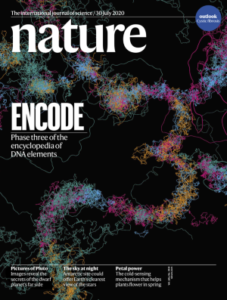Of the three billion base pairs in the human genome, only 2% code for the proteins that build and maintain our bodies. The other 98% harbors, among other things, potential regulatory regions – sequences that give cells the instructions and tools needed to turn protein recipes into an astonishingly complex organism.
The Encyclopedia of DNA Elements (ENCODE) collaboration was launched 17 years ago by the National Human Genome Research Institute with the goal of developing the tools and expertise needed to shed light on our genome’s mysterious majority. Now in its final year, ENCODE has made huge advances thanks to the combined scientific and technological prowess of several hundred researchers at dozens of institutions.
 Leading the project for Berkeley Lab are Diane Dickel, Len Pennacchio, and Axel Visel, co-PIs of the Mammalian Functional Genomics Laboratory in Biosciences’ Environmental Genomics and Systems Biology (EGSB) Division. They are co-authors on 4 of the 15 new ENCODE papers published this week as part of a special collection in Nature. In addition to their original research, Pennacchio and his Berkeley Lab colleagues also provided technical expertise and materials to other ENCODE consortium teams.
Leading the project for Berkeley Lab are Diane Dickel, Len Pennacchio, and Axel Visel, co-PIs of the Mammalian Functional Genomics Laboratory in Biosciences’ Environmental Genomics and Systems Biology (EGSB) Division. They are co-authors on 4 of the 15 new ENCODE papers published this week as part of a special collection in Nature. In addition to their original research, Pennacchio and his Berkeley Lab colleagues also provided technical expertise and materials to other ENCODE consortium teams.
Read more in the Berkeley Lab News Center.




